Supporting BC’s Resident Hunters
On December 10th, 2014 the Minister of Forests, Lands and Natural Resource Operations released his decision concerning how hunting licenses would be allocated between industry and resident British Columbia hunters. After consulting with constituents and stakeholders, I released a media statement raising concerns that the interests of resident British Columbia hunters were being set aside in favour of special industry interests. A few days later, I provided a more thorough analysis of the issues involved.
On February 6, amidst widespread pressure from BC resident hunters and the BC Wildlife Federation, the government revised its decision on wildlife harvest allocations slightly. But this was not enough.
Today, BC’s resident hunters held a rally on the Legislature lawn. I had the privilege of speaking at the rally and I reproduce the text of my speech below.
I also had honour of presenting a petition from over 16,000 British Columbians on behalf of the British Columbia Wildlife Federation today. The text of the petition is reproduced here:
“We, the undersigned, representing residents of British Columbia and supporters of resident hunting in the province, state that changes to the Province’s Wildlife Harvest Allocation Policy announced in December 2014 provide an unwarranted larger share of hunting permits to BC’s professional guides and outfitters, who primarily guide non-resident trophy hunters, at the expense of BC resident hunters.
The wildlife allocation made available to Guide Outfitters Association of BC members is unprecedented in North America and there is no economic justification for these allocation changes, which will adversely affect BC’s resident hunters.
We, the undersigned, respectfully request that the provincial government repeal the changes to the Wildlife Harvest Allocation Policy announced on December 10, 2014 by the Minister of Forests, Lands and Natural Resource Operations and limit non-resident hunters and Guide Outfitters Association of BC members to the Wildlife Harvest Allocation specified in the 2007 Wildlife Allocation Policy.“
Finally, today I introduced my first Private Member’s Bill: the Wildlife Amendment Act. My introduction is reproduced below. We’ve written up a more thorough discussion of the implications of the bill elsewhere.
Speech at the BC Resident Hunter Rally in Victoria
I’d like to begin by thanking all of you for coming to the legislature today. I know a lot of you had to travel quite far and take time off work to be here. But I am glad that you did. This issue is too important to let it quietly slip off the public radar and I commend you for being here today; for speaking up on behalf of hunters across BC; and for realizing that the February adjustment to the allocation policy was simply not good enough. It was little more than a patronizing response to your heartfelt feedback and concern for the future of hunting in BC.
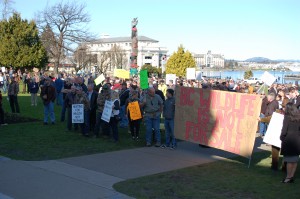 The erosion of hunter’s access to BC game is yet another example of government putting the needs of special interests ahead of those of British Columbians. Hunting is a foundational part of life for many people in BC. As you all know so well, it is way to connect with nature, spend quality time with your loved ones, and provide a clean, healthy source of protein for your families. Having that connection to one’s food, knowing its true value, and appreciating where it came from means that you have a profound understanding of the importance of conservation.
The erosion of hunter’s access to BC game is yet another example of government putting the needs of special interests ahead of those of British Columbians. Hunting is a foundational part of life for many people in BC. As you all know so well, it is way to connect with nature, spend quality time with your loved ones, and provide a clean, healthy source of protein for your families. Having that connection to one’s food, knowing its true value, and appreciating where it came from means that you have a profound understanding of the importance of conservation.
It has been a great honour for me to work closely with the B.C. Wildlife Federation – the province’s largest conservation organization – as I attempted to educate myself on allocation issues over the past few months.
Hunters in B.C. have had a rich history of conservation in our province, working tirelessly to ensure animal populations are healthy, abundant, and that their habitats are protected.
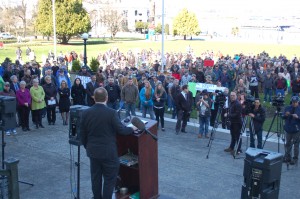 Despite running on a “families first” platform, the BC Liberal government has continued to put the vested interests of a select profitable few ahead of its own residents. In the hunting sector especially, we have seen a steady erosion of your rights as they continue to be reallocated to the guide outfitting industry.
Despite running on a “families first” platform, the BC Liberal government has continued to put the vested interests of a select profitable few ahead of its own residents. In the hunting sector especially, we have seen a steady erosion of your rights as they continue to be reallocated to the guide outfitting industry.
The December hunting permit amendment may have been the straw that broke the camel’s back, so to speak, but the BC government has been making the shift towards prioritizing the needs of industry over its own residents for the last decade.
The government’s actions have not been guided by the values of British Columbians. Nor have they been guided by independent expert advice. The numbers put forward in December weren’t even close to the allocation splits recommended by the ministry.
What troubles me is that according to the lobbyist registrar, the Guide Outfitters Association has had over 2,000 person meetings with government officials since 2011. Quite a number of them included Premier Clark.
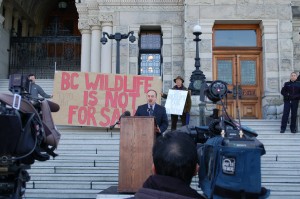 It’s clear that government has an ear to the concerns of guide outfitters.
It’s clear that government has an ear to the concerns of guide outfitters.
But today and together we’re here to say to government that that’s not enough. Together we are demanding that government listen to British Colmbians, the people that they are supposed to represent.
The increased allocation of BC’s wildlife to guide outfitters is an issue that affects all of us, not just the people here today.
I look forward to tabling the BCWF petition opposing the permit allocation amendments shortly. That should help government understand just how many people care about the unfair treatment of resident BC hunters.
I will also be tabling a bill that, if enacted, would make trophy hunting for non-residents more difficult by requiring them to remove the meat from their kills and transport it back to their home address.
For local sustenance hunters – the vast majority of hunters in B.C. – this bill merely echoes what they are already doing; harvesting wild game to bring the meat home to feed themselves and their families. For non-resident trophy hunters coming to B.C. in search of antlers or a hide this poses a larger logistical challenge of exporting large quantities of meat.
It is not a perfect solution to our problems, of course, but it will make the government engage in a conversation about where their interests lie and emphasize the importance of supporting sustainable, respectful hunting practices in our province — practices that are embodied by BC’s resident hunters and the BC Wildlife Federation.
Thank you.
Introduction of the Wildlife Amendment Act
I move introduction of the Wildlife Amendment Act for first reading.
It gives me great pleasure to introduce this bill that, if enacted, would restrict the practices of non-resident trophy hunters who come to B.C. to kill large game by making two specific amendments to the Wildlife Act.
The proposed changes remove grizzly bears from the list of animals exempt from meat harvesting regulations and ensure that all edible portions of animals harvested in B.C. are taken directly to the hunter’s residence.
As the legislation currently stands, the edible parts of big game animals (except cougars, wolves, lynx, bobcats, wolverines, and grizzly bears) must be removed from the animal and packed out to one’s home, or importantly for non-resident hunters, to a meat cutter or a cold storage plant. These last two options provide trophy hunters with legal meat laundering opportunities. By adding “directly or through” to the clause, hunters can still use meat cutters and cold storage plants to process their harvests, but it can’t end there. The meat must make it to their home address. If they want to donate that meat to charity after the fact they are welcome to do so, but they have to take it home first.
Hunters are already required to remove the edible portions from black bears. If enacted, this bill would bring meat harvesting standards for grizzly bears up to the same standard.
British Columbians, and in particular BC resident hunters, support these change. A 2013 McAllister Research poll found that 88% of British Columbians oppose trophy hunting. In addition to that, 95% of hunters said they believe you should not be hunting if you are not prepared to eat what you kill.
For local sustenance hunters – the vast majority of hunters in B.C. – this bill merely echoes what they are already doing; harvesting wild game to bring the meat home to feed their families. For non-resident trophy hunters coming to B.C. to kill an animal only for its hide, skull, or antlers this poses a logistical challenge of exporting large quantities of meat.
I look forward to second reading of the bill.
I move that this bill be placed on the orders of the day for second reading at the next sitting of the House.

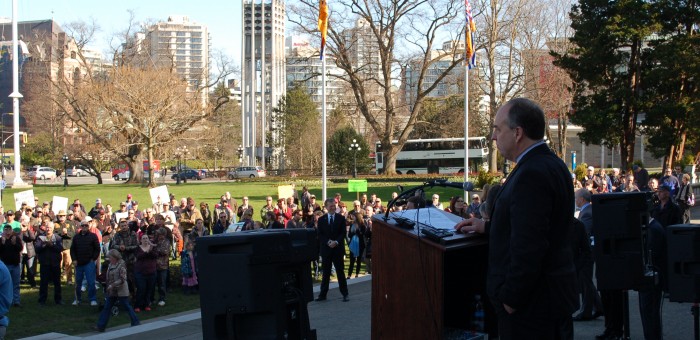
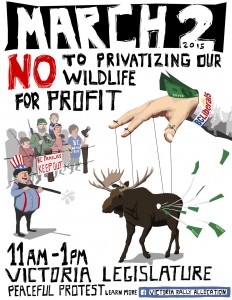



5 Comments
Well… in that case, you also should be enforcing all paying outfitter clients be removing all edible potions to THEIR personal addresses as well. Should you not ?
Or is there more outfitter special treatment here?
Hi Andy, this is exactly what my Private Member’s bill states. All edible portions must go back to a hunter’s personal domicile, whether they be in BC, Texas of Southern Australia.
Thank you for standing up for bc hunters rights. It makes me sad, that the so called family first liberals, have ignored bc families for so long. Some of us depend on the meat we hunt to feed us and our families. I have never been been granted an LEH or had the chance to hunt a moose, now I fear I never will in my lifetime. Just the fact the they would put the interests of trophy hunters, before people trying to FEED their children is despicable.
Hello Andrew,
Thanks for supporting BC Resident Hunters! The protest turnout was not bad and I’m sure we can get more to participate in future if necessary.
I support your Wildlife Amendment Act. If a hunter will not eat it, it should not be shot.
Best Regards,
Herb
Thank you Herb, it is an attempt to bring the environmental and hunting communities together. Many urban environmentalists don’t realize that BC hunters and their supporting organizations (like BCWF, Ducks Unlimited and Fish and wildlife organizations) are some of the most active conservationalists. At the same time, some hunters believe that most urban environmentalists are out to stop hunting. The reality is that almost everyone I have spoken with is on the same page. They support hunting for food. They don’t support hunting only for trophies. This bill supports the former and penalizes the later.